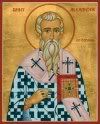Ecumenical alert!
So I read about this group some time ago in a
certain publication but had forgotten about it until now. What is a year in Orthotime anyway?
The first questionable content of said article is the mention of an "ecumenical officer" - which I ask is exactly what? Maybe they are in charge of arresting those accused of "intolerance"? I did a little google search on these so-called "ecumenical officers" and evidently it is a hip term now with the ecumenical kids.
The article next states that "Christian Churches Together" began with an "effort to form 'a more credible Christian witness'". At this point one must ask: what "witness" can be more "credible" than the Truth that is Jesus Christ which is present in the Orthodox Church? From this groups webpage we read the following, "CCT is a new forum growing out of a deeply felt need to broaden and expand fellowship, unity, and witness among the diverse expressions of Christian faith today". I don't know about you but I always like it when degrees of heretical beliefs are referred to as "diverse expressions of Christian faith". I'll tell you one thing - that Arius had some nifty "diverse expressions"...
Moving right along to the real issue of social justice I will quote from the next paragraph: "Organizers said that tackling poverty would be the group’s first priority." ...no comment. And from the webpage: "CCT, out of its commitment to grow closer together in Christ, can offer a significant and credible voice in speaking to contemporary culture on issues of life, social justice and peace." I refer you to
this post.Now on to the meat of the matter we look at "The Chicago Statement" and find such statements as "We long for the broken body of Christ made whole, where unity can be celebrated in the midst of our diversity" and that "common witness will be visible through our: Seeking the guidance of the Holy Spirit through biblical, spiritual and theological reflection, Engaging in common prayer". So now we have Orthodox believing that the Body of Christ is broken and that they must go outside the Church, among heterodox, to seek the Holy Spirit through prayer with them?
Next you ask, "How do I become a member!?" And they answer, "All you have to do is
confess Jesus Christ as God and Savior according to the scriptures and you're in!" And you say, "Good because I thought Arius had the correct interpretation of the scriptures!"
P.S.: It is not by chance that I mention Arius - today is the feast of
St. Athanasius who smashed that heretic of heretics.



